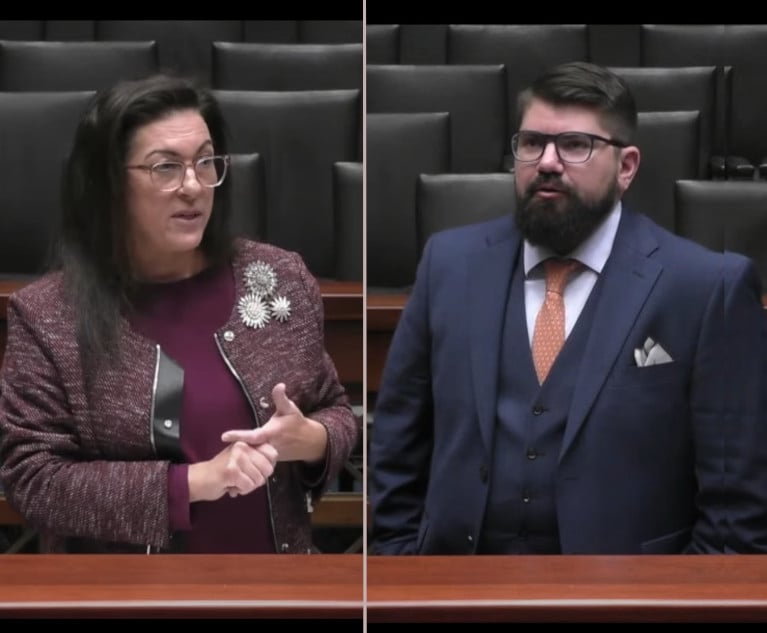 Justice Scale and Gavel
Justice Scale and Gavel A Conflicting Tune: Texas Courts Differ On Trade Secret Preemption
In The Beatles' song "Hello, Goodbye," Sir Paul McCartney sings about conflicting instructions for the listener: "You say yes, I say no. You…
March 09, 2023 at 05:29 PM
8 minute read
In The Beatles' song "Hello, Goodbye," Sir Paul McCartney sings about conflicting instructions for the listener: "You say yes, I say no. You say stop, and I say go go go." Well, when dealing with trade secret preemption, courts across the United States are singing the same conflicting tune, and Texas is joining in the song. Alternative theories of relief in trade secret litigation is a concept courts often struggle with when faced with statutory preemption provisions like the ones contained in various states' Uniform Trade Secrets Act (UTSA). The crux of the debate is whether UTSA preempts alternative theories of relief that are grounded on information that does not qualify as a "trade secret." Courts in favor of broad preemption generally claim that permitting claims based on use of information that does not technically qualify as trade secrets, but are based on the same facts as trade secrets claims, undermines the motivation for the UTSA's passage to begin with—that is, to provide uniformity and clarity and otherwise streamline trade secrets litigation. The proponents of a narrow view take a wait-and-see approach, indicating that the preemption provisions apply to claims based on actual "trade secrets" and, thus, dismissal in the name of preemption can only happen once the court makes a determination as to whether the information constitutes a trade secret.
This content has been archived. It is available through our partners, LexisNexis® and Bloomberg Law.
To view this content, please continue to their sites.
Not a Lexis Subscriber?
Subscribe Now
Not a Bloomberg Law Subscriber?
Subscribe Now
NOT FOR REPRINT
© 2024 ALM Global, LLC, All Rights Reserved. Request academic re-use from www.copyright.com. All other uses, submit a request to [email protected]. For more information visit Asset & Logo Licensing.
You Might Like
View All
Houston Appeals Court Split Over Race Discrimination Suit Involving COVID-19 Vaccine Distribution
4 minute read
Overtime Rewind: Texas Court Ruling Unravels FLSA Salary Level Increases
4 minute read
'It's Like They Lynched You:' Law Professor's Discrimination Claim Reaches High Court
7 minute readTrending Stories
- 1Tik Tok’s ‘Blackout Challenge’ Confronts the Limits of CDA Section 230 Immunity
- 2AI and the Evolution of Legal Talent Functions
- 3Morgan Lewis To Acquire Kramer Levin's Paris Office
- 4Advice to Practicing Lawyers About Their Future
- 5Retired Judges Say Newman’s Challenge to Disability Law Should Proceed
Who Got The Work
Michael G. Bongiorno, Andrew Scott Dulberg and Elizabeth E. Driscoll from Wilmer Cutler Pickering Hale and Dorr have stepped in to represent Symbotic Inc., an A.I.-enabled technology platform that focuses on increasing supply chain efficiency, and other defendants in a pending shareholder derivative lawsuit. The case, filed Oct. 2 in Massachusetts District Court by the Brown Law Firm on behalf of Stephen Austen, accuses certain officers and directors of misleading investors in regard to Symbotic's potential for margin growth by failing to disclose that the company was not equipped to timely deploy its systems or manage expenses through project delays. The case, assigned to U.S. District Judge Nathaniel M. Gorton, is 1:24-cv-12522, Austen v. Cohen et al.
Who Got The Work
Edmund Polubinski and Marie Killmond of Davis Polk & Wardwell have entered appearances for data platform software development company MongoDB and other defendants in a pending shareholder derivative lawsuit. The action, filed Oct. 7 in New York Southern District Court by the Brown Law Firm, accuses the company's directors and/or officers of falsely expressing confidence in the company’s restructuring of its sales incentive plan and downplaying the severity of decreases in its upfront commitments. The case is 1:24-cv-07594, Roy v. Ittycheria et al.
Who Got The Work
Amy O. Bruchs and Kurt F. Ellison of Michael Best & Friedrich have entered appearances for Epic Systems Corp. in a pending employment discrimination lawsuit. The suit was filed Sept. 7 in Wisconsin Western District Court by Levine Eisberner LLC and Siri & Glimstad on behalf of a project manager who claims that he was wrongfully terminated after applying for a religious exemption to the defendant's COVID-19 vaccine mandate. The case, assigned to U.S. Magistrate Judge Anita Marie Boor, is 3:24-cv-00630, Secker, Nathan v. Epic Systems Corporation.
Who Got The Work
David X. Sullivan, Thomas J. Finn and Gregory A. Hall from McCarter & English have entered appearances for Sunrun Installation Services in a pending civil rights lawsuit. The complaint was filed Sept. 4 in Connecticut District Court by attorney Robert M. Berke on behalf of former employee George Edward Steins, who was arrested and charged with employing an unregistered home improvement salesperson. The complaint alleges that had Sunrun informed the Connecticut Department of Consumer Protection that the plaintiff's employment had ended in 2017 and that he no longer held Sunrun's home improvement contractor license, he would not have been hit with charges, which were dismissed in May 2024. The case, assigned to U.S. District Judge Jeffrey A. Meyer, is 3:24-cv-01423, Steins v. Sunrun, Inc. et al.
Who Got The Work
Greenberg Traurig shareholder Joshua L. Raskin has entered an appearance for boohoo.com UK Ltd. in a pending patent infringement lawsuit. The suit, filed Sept. 3 in Texas Eastern District Court by Rozier Hardt McDonough on behalf of Alto Dynamics, asserts five patents related to an online shopping platform. The case, assigned to U.S. District Judge Rodney Gilstrap, is 2:24-cv-00719, Alto Dynamics, LLC v. boohoo.com UK Limited.
Featured Firms
Law Offices of Gary Martin Hays & Associates, P.C.
(470) 294-1674
Law Offices of Mark E. Salomone
(857) 444-6468
Smith & Hassler
(713) 739-1250







